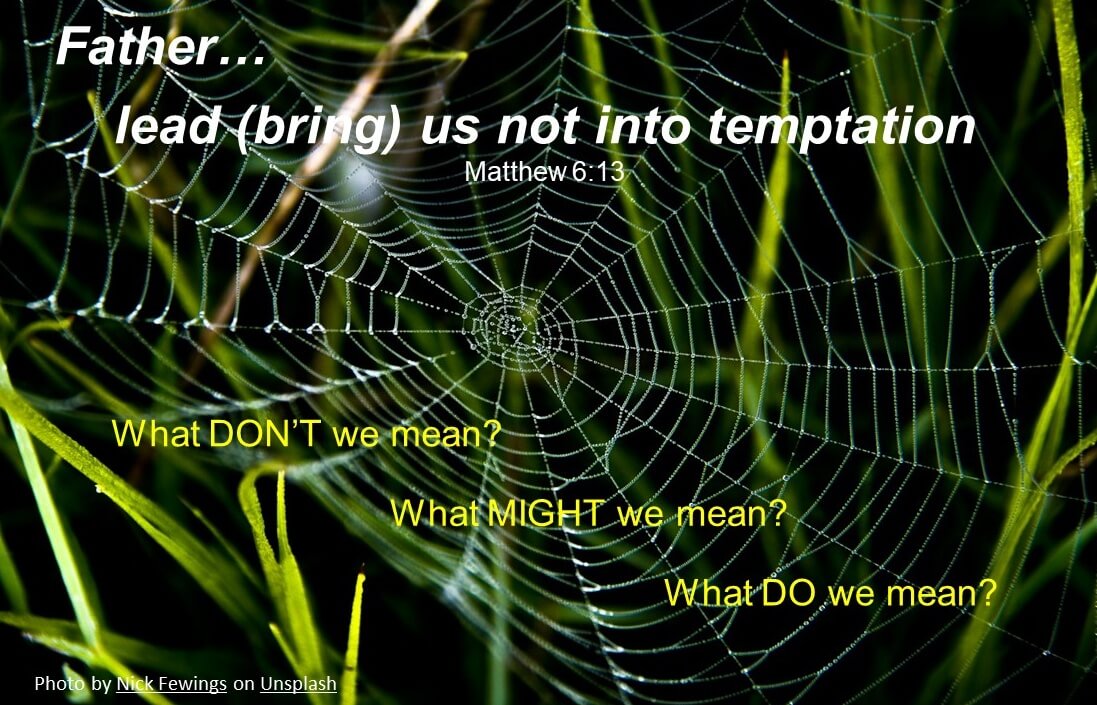The prayer that Jesus gave his disciples in Luke 11 is easy to recite. But unless we go beyond reciting, we’re likely to glide past the truths he wanted his disciples to unpack. We can recite the line, Don’t bring us into temptation, but what do we mean by it?
Jesus wanted to draw his disciples into his admiration of the Father, so he began the prayer with praise of the Father’s holy name. Each ASKING point that follows draws attention to something wonderful about the Father. But, if we recite the words without pondering the truths, we can easily miss the admiration prompts.
For instance, the request, And lead (bring) us not into temptation awakens our celebration of the Father’s protection. He promises to be our constant Shield, but he wants us to ask for his protection. In doing so, we not only show trust, but are drawn into worshipping him as our Protector.
But what do we mean by, Don’t bring us into temptation?
What we don’t mean
We’re not saying, Father, don’t tempt us to sin. James makes it clear that the Lord doesn’t tempt anyone; our own desires give birth to sin (Jas 1:13-14). And we don’t mean, Don’t lead us into situations where we face temptations. In the world, exposure to sin is unavoidable, and resisting sin’s enticement is an important part of daily life in Christ.
What we might mean
Maybe the word temptation could be translated trials (as in verse 12)? The New Testament uses the original word both ways; frequently it refers to trials. Sometimes, the Lord gives his people an escape route from difficult or dangerous situations, but usually, he gives grace to endure trials and be strengthened through them. Asking the Lord to keep us from trials isn’t wrong, but it probably isn’t the main point of the prayer request.
What we do mean
James gives us three phases of temptation: attraction (enticement), craving, and decision (to sin). At the centre of the action is desire (Jas 1:14-15). Temptation’s strength lies in its appeal to what we want/like/crave. God created us with the power of holy desire. The Fall corrupted it, but Christ has restored to us the freedom to desire what pleases him. However, we live in a conflict zone where pure and impure desires contend for power over our life-shaping choices.
The power of desire (and its outworking through choices) serves our journey of growing in Christ’s likeness and in his purpose for our life. Our desires carry weight with God; he gives us the desires of our heart (Psm 37:3-4). In other words, he brings us into the good things that we desire.
But what about harmful desires?
The Lord has given us an internal warning system. His Word in us distinguishes between the pure and impure (Heb 4:12), and his Spirit withdraws his peace to alert us when we make room for a desire that displeases him. If we pursue that ‘want’ anyway, the Lord normally doesn’t rush in to crush our power of desire and cancel the wrong choice we made. He may actually give us what we crave (viz. bring us into what we desire).
Numbers 11 is a sobering record of God giving Israel the thing they craved in the desert. In the New Covenant frame of life in Christ, wrong desires with their unpleasant consequences can become an arena for his loving correction and training. But can we pray to avoid the pain and loss of unholy desires and choices?
That’s where this prayer comes in: Don’t bring us into temptation.
It’s a plea that the Lord NOT bring us into things we desire IF they will harm us and grieve him. No matter how strong the temptation’s pull – how much we crave it, and how passionately we might pray to receive it – we’re asking that he NOT give us our way. It’s a prayer that relinquishes the right to our power of desire when our heart fixes onto anything that displeases him.
Don’t bring us into temptation. We pray this in the frame of admiration of the Father’s loving protection. We appeal to him, our Protector, to deny us the harmful things we desire.
- Set aside time to unpack the wonderful truth of the Father’s protective care. Find a few scriptures that inform this truth, then pray your admiration of him as your Keeper/Protector.
- Then, as you repeat those words, Father, don’t bring me into temptation, tell the Father what you mean by that request. As a pray-er, unpack these words that Jesus gave his disciples.
- In Christ, we have the power of pure desire. But it’s contested by appetites that are impure, or that hinder his plans for our life-journey. It’s always good to check whether we are perhaps reaching for any desire/want – even asking the Father to permit or provide it – that is missing his signature of agreement.




